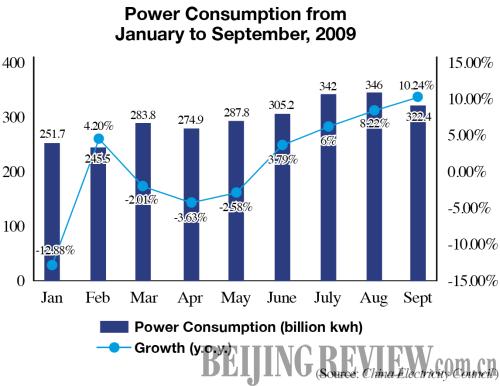| 
Numbers of the Week
8.51 million
New employment positions filled in China's urban areas hit 8.51 million in the first nine months of 2009, around 94 percent of the government target of 9 million set for the whole year.
154.55%
China Life Insurance Co. Ltd., the country's largest life insurer, posted a net profit of 5.95 billion yuan ($871.74 million) in the third quarter of this year, up 154.55 percent year on year.
TO THE POINT: China's fight for a greater say in the pricing of international iron ores has been a tough battle and may become even more difficult as the country imports a soaring amount of ore. Unable to find a niche elsewhere, internationally speculative hot money appears to be returning to China. Domestic companies are stepping onto the global stage as made apparent by their soaring outbound investments. The aluminum titan Chalco jumps back into the black against the backdrop of the economic upturn. The loan balance to small businesses grows appreciably to staunch their financial woes.
By HU YUE
Steel Negotiations
For Chinese iron ore negotiators, 2009 was a tough year. Despite unprecedented clout as the world's largest ore importers, they had been unable to clinch a deeper price discount in the midst of the souring business mood. As they look ahead to set the tone for the price talks of the next contract year, they find themselves in a still weak bargaining position.
The upcoming negotiating round seems to be turning into a seesaw-like predicament with differences of opinion on the primary question as to whether prices should rise or fall. The China Iron and Steel Association (CISA) has pointed to domestic oversupplies and vowed a clampdown on excess capacities.
On the other side of the argument, ore miners have publicly pushed for a 30-35 percent increase, citing buoyant Chinese demands and a weak U.S. dollar that continues to push up commodity prices.
Slowly but surely, the balance of bargaining power is tilting in the miners' favor. Iron ore imports in September hit a record high of 64.55 million tons and spot prices for ores have rebounded amid the global recovery, putting the Chinese side in a tight spot.
Chinese negotiators are advancing from words to work. CISA invited an array of emerging miners, like the Fortescue Metals Group and Aquila Resources Ltd. of Australia, to the annual China International Steel and Raw Materials Conference held on October 15-17 in Qingdao. This is widely seen as an attempt to diversify from a reliance on the big three iron ore explorers.
Domestically, the CISA has also stepped up efforts to consolidate the fragmented steel industry and strengthen supervision over iron ore imports, in a move to build a concerted negotiating front.
A Hot Potato
As a mood of optimism returns to the Chinese economy, the wave of speculative hot money appears to be roaring back.
One clear clue is that in September $61.8 billion was added to China's foreign exchange reserves, around $41 billion more than the trade surplus in combination with foreign direct investment (FDI). The difference was widely believed to be caused by the international speculative capital that found its way around regulatory controls and into the country—usually through companies overstating FDI or over-invoicing exports.
Motivation for the capital inflows is simple. As a weaker U.S. economy takes shine off its currency, international speculators turn their eyes to China where the economic uptick offers a higher level of returns. In addition to this, an expected appreciation of the renminbi offers a risk-free source of profit, said a report by the Chinese Academy of Social Sciences.
The hot money is a double-edged sword. It increases net investments and feeds the stock markets with ample liquidity, but its profit-chasing nature means more volatility and wild swings in asset prices. An abrupt withdrawal, in particular, would have the potential to send the economy into an abyss.
| 